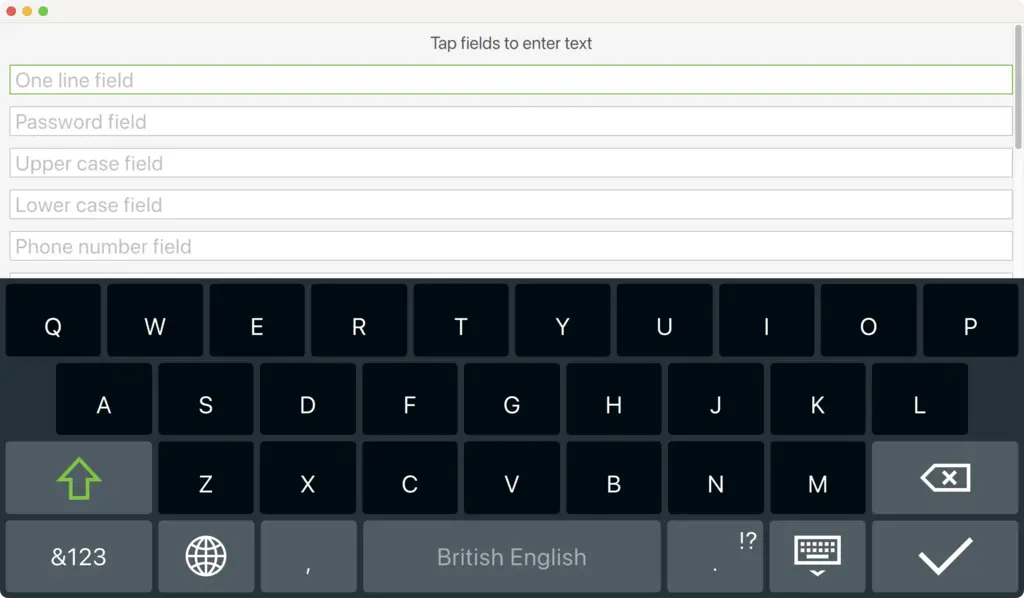Virtual Keyboard in Qt Quick
This example shows how to use the virtual keyboard in a Qt Quick application.

The example has two implementations: one for desktop platforms and another for embedded platforms. The former version enables text input into several text fields using the virtual keyboard, whereas the latter version uses the same UI but with a custom virtual keyboard InputPanel. The following snippets show how to set up the project to choose the appropriate implementation based on the CONFIG options:
- In qmake (
basic.pro):!qtConfig(vkb-desktop) { DEFINES += MAIN_QML=\\\"basic-b2qt.qml\\\" } else { DEFINES += MAIN_QML=\\\"Basic.qml\\\" } - In CMake (
CMakeLists.txt):if(NOT QT_FEATURE_vkb_desktop) target_compile_definitions(basic PUBLIC MAIN_QML="basic-b2qt.qml" ) endif() ... if(QT_FEATURE_vkb_desktop) target_compile_definitions(basic PUBLIC MAIN_QML="Basic.qml" ) endif()
The example enables the virtual keyboard by setting the QT_IM_MODULE environment variable before loading the .qml file:
#include <QQuickView>
#include <QGuiApplication>
#include <QQmlEngine>
int main(int argc, char *argv[])
{
qputenv("QT_IM_MODULE", QByteArray("qtvirtualkeyboard"));
QGuiApplication app(argc, argv);
QQuickView view(QString("qrc:/%2").arg(MAIN_QML));
if (view.status() == QQuickView::Error)
return -1;
view.setResizeMode(QQuickView::SizeRootObjectToView);
view.show();
return app.exec();
}Besides this, it uses custom TextField and TextArea items to configure the [ENTER] key behavior using the EnterKeyAction attached property.
import QtQuick
import QtQuick.Controls
import QtQuick.VirtualKeyboard
import "content"
Rectangle {
...
TextField {
width: parent.width
placeholderText: "One line field"
enterKeyAction: EnterKeyAction.Next
onAccepted: passwordField.focus = true
}
...
TextArea {
id: textArea
width: parent.width
placeholderText: "Multiple line field"
height: Math.max(206, implicitHeight)
}
}The TextField and TextArea controls extend the respective Qt Quick Controls 2 types with enterKeyEnabled and enterKeyAction properties. The TextField and TextArea instances in the snippet can set these properties to change the default behavior.
Running the Example
To run the example from Qt Creator, open the Welcome mode and select the example from Examples. For more information, see Qt Creator: Tutorial: Build and run.
© 2026 The Qt Company Ltd. Documentation contributions included herein are the copyrights of their respective owners. The documentation provided herein is licensed under the terms of the GNU Free Documentation License version 1.3 as published by the Free Software Foundation. Qt and respective logos are trademarks of The Qt Company Ltd. in Finland and/or other countries worldwide. All other trademarks are property of their respective owners.

